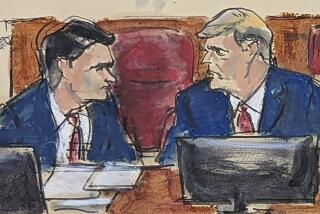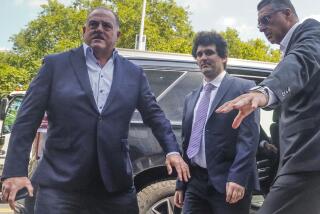Case Against Former Tyco Execs to Focus on Excesses
NEW YORK — Jury selection began Monday in the fraud trial of Tyco International Ltd. former top executives L. Dennis Kozlowski and Mark Swartz, who are accused of looting the conglomerate of more than $600 million to finance lavish lifestyles.
With the trial of former Chief Executive Kozlowski and former Chief Financial Officer Swartz expected to last as long as four months, court officials summoned 1,500 potential jurors to Supreme Court in Manhattan for jury selection.
The defendants, who have pleaded not guilty to the 37-count indictment, face up to 30 years in prison if convicted of the top count of enterprise corruption.
The trial will focus on lavish spending, handsomely paid subordinates and sleepy watchdogs. Prosecutors will allege the two men looted $600 million from Tyco in one of the biggest corporate rip-offs in recent U.S. history.
The heart of the Manhattan district attorney’s case centers on Tyco loan programs, charging that Kozlowski and Swartz illegally tapped millions of dollars in company funds to pay for mansions, yachts, Harry Winston jewelry, paintings and a $2-million 40th birthday party for Kozlowski’s wife in Italy.
Dating to the 1980s, Tyco loaned money to key executives to pay taxes on vested restricted stock, a program designed to encourage stock ownership among key Tyco leaders.
Tyco’s compensation committee administered the loan program, and the indictment against Kozlowski and Swartz says they caused loans to be forgiven without the board’s knowledge.
Kozlowski, who built Tyco into one of the world’s largest manufacturing conglomerates through a dizzying array of acquisitions during his 10 years as chairman, and Swartz are being prosecuted under a racketeering statute usually reserved for organized crime activities.
Their lawyers say prosecutors have attempted “to distort and expand the reach of criminal law” to cover what is really a corporate governance dispute over the administration of employee loan programs.
“The case actually involves openly adopted and implemented loan and compensation programs, accurately reflected on the books and records of the company,” according to defense papers.
At the request of the defense, $100,000 worth of equipment -- including a 9-foot-by-15-foot projection screen and dozens of flat-screen monitors, printers and laptop computers -- were installed last week inside the 62-year-old courtroom.
To screen the initial groups of 100 prospective jurors, Judge Michael Obus began by asking such questions as whether individuals have difficulty speaking or understanding English and whether they know the defendants or lawyers.
Most of this week will be taken up with the judge asking each of the groups of 100 panel members the same questions until the search is narrowed from 1,500 people to 100 prospects. Then lawyers and prosecutors will put the panelists through extensive questioning.
More to Read
Inside the business of entertainment
The Wide Shot brings you news, analysis and insights on everything from streaming wars to production — and what it all means for the future.
You may occasionally receive promotional content from the Los Angeles Times.










